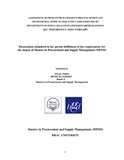Assessment of present procurement process of private owned rural piped water supply implemented by Department of Public Health Engineering (DPHE) based on key performance indicators (KPI)

View/Open
Date
2016-02-06Publisher
BRAC UniversityAuthor
Akhter, FirozaMetadata
Show full item recordAbstract
Rural piped water supply system is a new concept for providing safe water to the rural people. Water
supply system of Bangladesh is quite challenging due to presence of arsenic and salinity in ground
water, low water level and highly varied availability of surface water throughout the year. Operation and
management of the system is the most challenging factor among all. The government organization does
not have sufficient financial and administrative support to operate and manage water supply systems. A
Build, Own, Operate, Transfer (BOOT) model was developed and introduced under a project of DPHE
namely Bangladesh Water Supply Program Project (BWSPP). However, the water supply systems
developed under this project are not running successfully. Only 4 out of 21 schemes are expecting to get
back their investment within 18 years. All other schemes are running without having any profit. The
procurement process for rural piped water supply under this project was different than usual procedure.
The sponsors who were supposed to build supply systems select the location. There were no
competitions for a particular scheme. From the lesson learned from BWSPP, the later project
Bangladesh Rural Water Supply and Sanitation Project (BRWSSP) took initiative to ensure
competitiveness in the procurement process. Out of 45 KPIs that were used by CPTU to evaluate the
procurement process, 25 KPI were used to evaluate the efficiency, competitiveness, compliance and
transparency of the procurement process considered for the study. The result shown that still people
working in water supply sector not aware about the importance of procurement process in implementing
PPP model. The transparency and competitiveness was ensured in the procurement process. However,
there are still improvements required in ensuring compliance and efficiency in the procurement
processes of rural piped water supply system.
